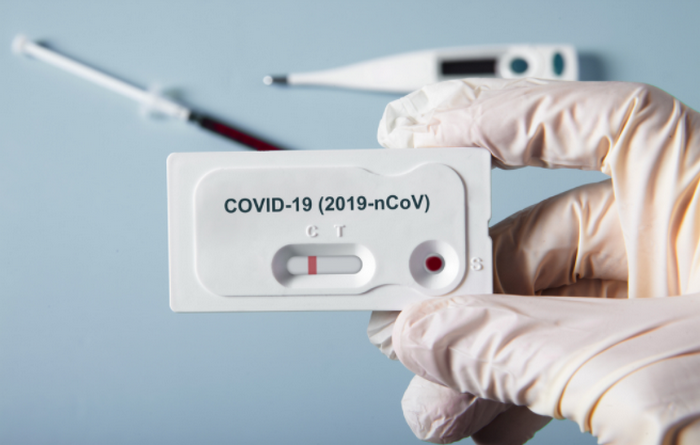Brazilian Researchers develop rapid COVID-19 diagnostic test

Reviewed by Emily Henderson, B.Sc.Feb 2 2021
Brazilian Researchers develop rapid COVID-19 diagnostic test affordable for low-income families.
A test that detects antibodies to the novel coronavirus in 10 minutes and costs only a fifth of the market average has been developed by researchers at the University of São Paulo's São Carlos Chemistry Institute (IQSC-USP) and Brazilian startup Biolinker, with São Paulo Research Foundation - FAPESP's support.
The device works similarly to the rapid tests available now in pharmacies. It analyzes a drop of blood, and two red LEDs light up if it detects the presence of immunoglobulin G (IgG) antibodies, which are produced in the acute phase of COVID-19 (ten days after the onset of symptoms on average).
The more antibodies there are in the blood, the brighter the red color. We believe this means the test can also be used to monitor the response to vaccination. We know not everyone develops protective immunity after being vaccinated. We also know the level of antibodies declines over time."
Frank Crespilho, Professor at IQSC-USP and Principal Investigator
The study was conducted by two of Crespilho's students, Karla Castro and Isabela Mattioli. According to Crespilho, the technology can easily be adapted to the novel SARS-CoV-2 variants, if necessary.
The test can be sold for 30 Brazilian Reais (now about 5.50 US dollars) once it has been approved by ANVISA, the national health surveillance authority, he said. Similar tests can currently be purchased in Brazil for about 140 BRL. The researchers optimized the quantity of raw materials and reagents to lower its production cost and developed a technology based on nanoparticles to facilitate IgG detection.
"We combined a gold nanoparticle [which originates the red color] with a piece of the virus's spike protein recognized by human antibodies. This bioconjugate is about a millionth of the size of a human hair," Crespilho said.
The virus's spikes form the corona-like structure that suggested its family name. They enable the virus to enter and infect human cells by binding to the ACE-2 receptor on the cell surface.
Related Stories
- What are the potential benefits of SARS-CoV-2 antigen-based rapid diagnostic tests?
- Could anterior nasal swabs be an effective alternative for SARS-CoV-2 testing?
- Researchers develop protocols for rapid serological surveys of SARS-CoV-2 infection
To develop the molecule used in the test device, Biolinker's researchers worked in the laboratory to synthesize the docking tip of the spike protein, known as the receptor-binding domain (RBD). According to Mona Oliveira, Biolinker's chief science officer and co-founder, they used a recombinant DNA technology involving bacteria genetically modified to express the viral protein in vitro. This part of the process was supported by São Paulo Research Foundatin - FAPESP's Innovative Research in Small Business Program (PIPE) and FINEP, the Brazilian Innovation Agency.
"All reagents and other inputs used by the device are produced in Brazil, which helps reduce the cost. We worked around the clock to develop it in just four months," said Crespilho, who heads the University of São Paulo's Bioelectrochemistry and Interface Laboratory. The aim is to expand testing in Brazil by making it affordable for low-income families. "We designed it as a means of enabling mass testing at a competitive cost in line with economic reality," he said.
Testing is underway to determine the accuracy of the method developed by the IQSC-USP group. The scientists are also working on a plan to ramp up production and have other groups perform trials to validate the methodology. Around 500 units will be produced and tested using samples from patients treated at São Paulo State University (UNESP) in Botucatu, the Federal University of São Carlos (UFSCar) and the Federal University of São Paulo (UNIFESP).
"We're also negotiating with groups in the Northeast region," Crespilho said. "Validation will take about a month. Then we'll apply for approval by ANVISA."Source:
São Paulo Research Foundation (FAPESP)
COPYRIGHTS
Copy & Paste lenken øverst for Yandex oversettelse til Norsk.
WHO and WHAT is behind it all ? : >
The bottom line is for the people to regain their original, moral principles, which have intentionally been watered out over the past generations by our press, TV, and other media owned by the Illuminati/Bilderberger Group, corrupting our morals by making misbehaviour acceptable to our society. Only in this way shall we conquer this oncoming wave of evil.
Commentary:
Administrator
HUMAN SYNTHESIS
All articles contained in Human-Synthesis are freely available and collected from the Internet. The interpretation of the contents is left to the readers and do not necessarily represent the views of the Administrator. Disclaimer: The contents of this article are of sole responsibility of the author(s). Human-Synthesis will not be responsible for any inaccurate or incorrect statement in this article. Human-Synthesis grants permission to cross-post original Human-Synthesis articles on community internet sites as long as the text & title are not modified.
The source and the author's copyright must be displayed. For publication of Human-Synthesis articles in print or other forms including commercial internet sites. Human-Synthesis contains copyrighted material the use of which has not always been specifically authorized by the copyright owner. We are making such material available to our readers under the provisions of "fair use" in an effort to advance a better understanding of political, economic and social issues. The material on this site is distributed without profit to those who have expressed a prior interest in receiving it for research and educational purposes. If you wish to use copyrighted material for purposes other than "fair use" you must request permission from the copyright owner.